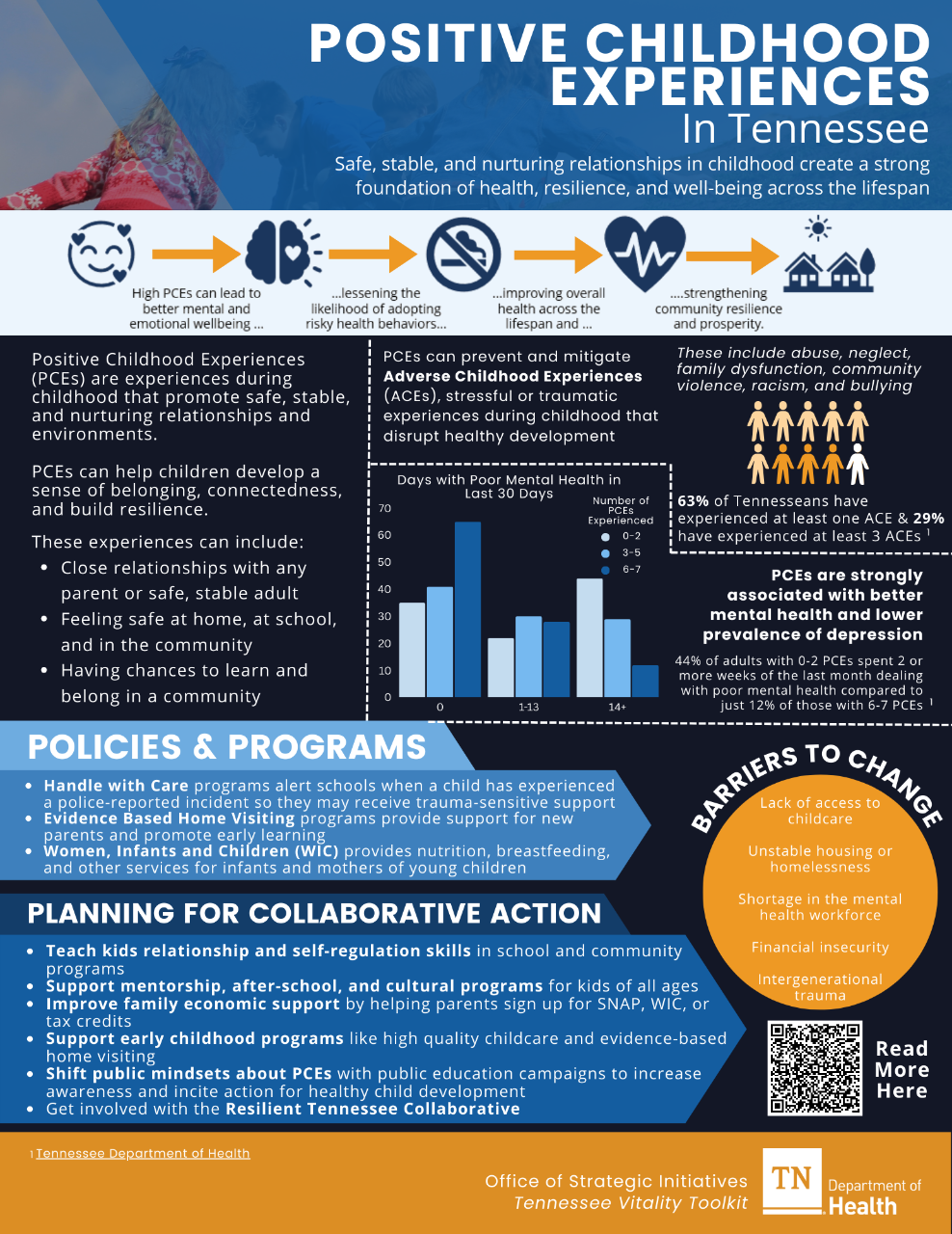Positive Childhood Experiences
Healthy child development is the foundation that leads to strong communities and a healthy economy. When communities invest in the early childhood years, they are supporting children’s mental and physical health, their ability to achieve in school and work settings, and to become responsible citizens in adulthood. These are all vital elements of community health and prosperity.
Positive Childhood Experiences (PCEs) are experiences during childhood that promote safe, stable, and nurturing relationships and environments. These experiences can include close relationships with any parent or safe, stable adult; feeling safe at home, at school, and in the community; and having chances to learn and belong in a community. PCEs can help children develop a sense of belonging, connectedness, and build resilience.
Encouraging safe, stable, and nurturing relationships and environments for children has lifelong positive effects on the health of Tennesseans. Children with PCEs are less likely to engage in risky health behaviors, less likely to experience long-term illness, and more likely to enjoy better mental health and overall health later in life.

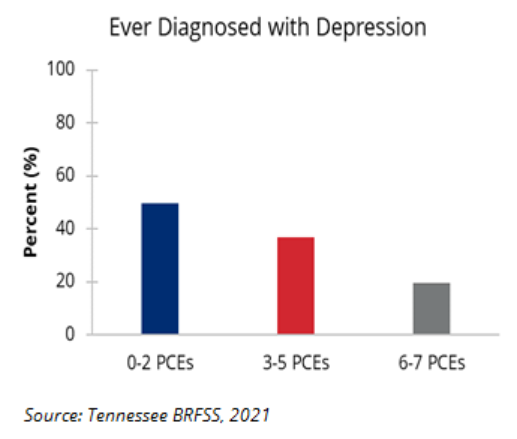
Recent surveys in Tennessee show that PCEs can lead to better mental and emotional well-being. Tennesseans who report having higher PCEs in childhood also report better mental health in adulthood. Increased Positive Childhood Experiences have been linked to a lower prevalence of depression.
Improved emotional well-being lessens the probability of unhealthy behaviors. In Tennessee adults with more PCEs reported having “never smoked” cigarettes and fewer reported being a “former smoker.”
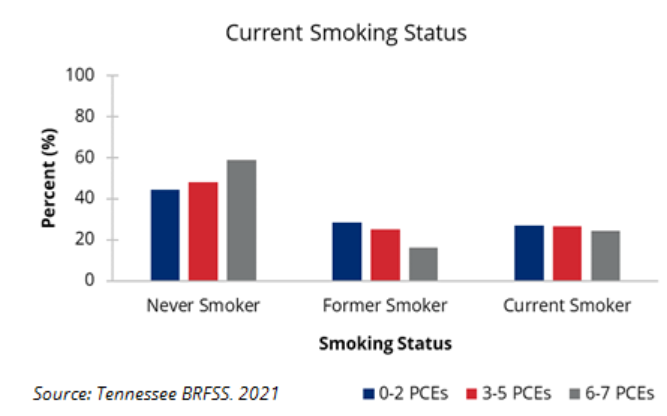
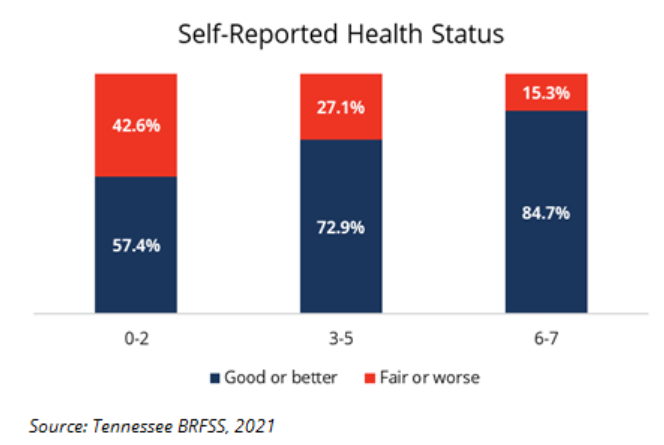
PCEs are associated with improved overall health across the lifespan. As the number of PCEs increase, so did the probability of adults in Tennessee reporting good or better health.
Healthy development in children can be derailed by Adverse Childhood Experiences (ACEs). ACEs are potentially traumatic events that occur during childhood that can affect health, such as abuse, neglect, or separation from parents. Community factors that undermine a child’s sense of safety or stability — such as poverty, community violence, or low housing affordability — are also considered ACEs. Individuals who experience higher numbers of ACEs face higher risks for many health concerns as adults. Over 50% of the Tennessee population has experienced at least one ACE, with 20% of our state having experienced three or more. This high prevalence of ACEs indicates a crucial need to address ACEs among Tennesseans.
Fortunately, the negative effects of ACEs on child development can be buffered by PCEs. Still, even children without traumatic experiences need to feel belonging and connectedness to thrive. It is the responsibility of families and communities to work together to provide environments where children can experience safe, stable, and nurturing relationships, setting them up to succeed.
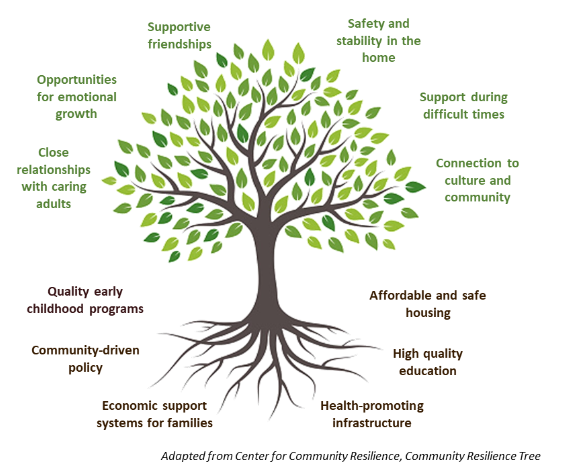
When we focus on community conditions (seen in the roots of the tree) and support opportunities for safety, stability, and meaningful relationships (seen in the leaves of the tree), we can help all children thrive, no matter where they live.
Many communities face increased barriers in access to social supports that promote PCEs and protect against ACEs. Additionally, these groups often face barriers to treatment for the health concerns that emerge from ACEs. Strategies to increase PCEs might address disparities when focused on some of the following groups:
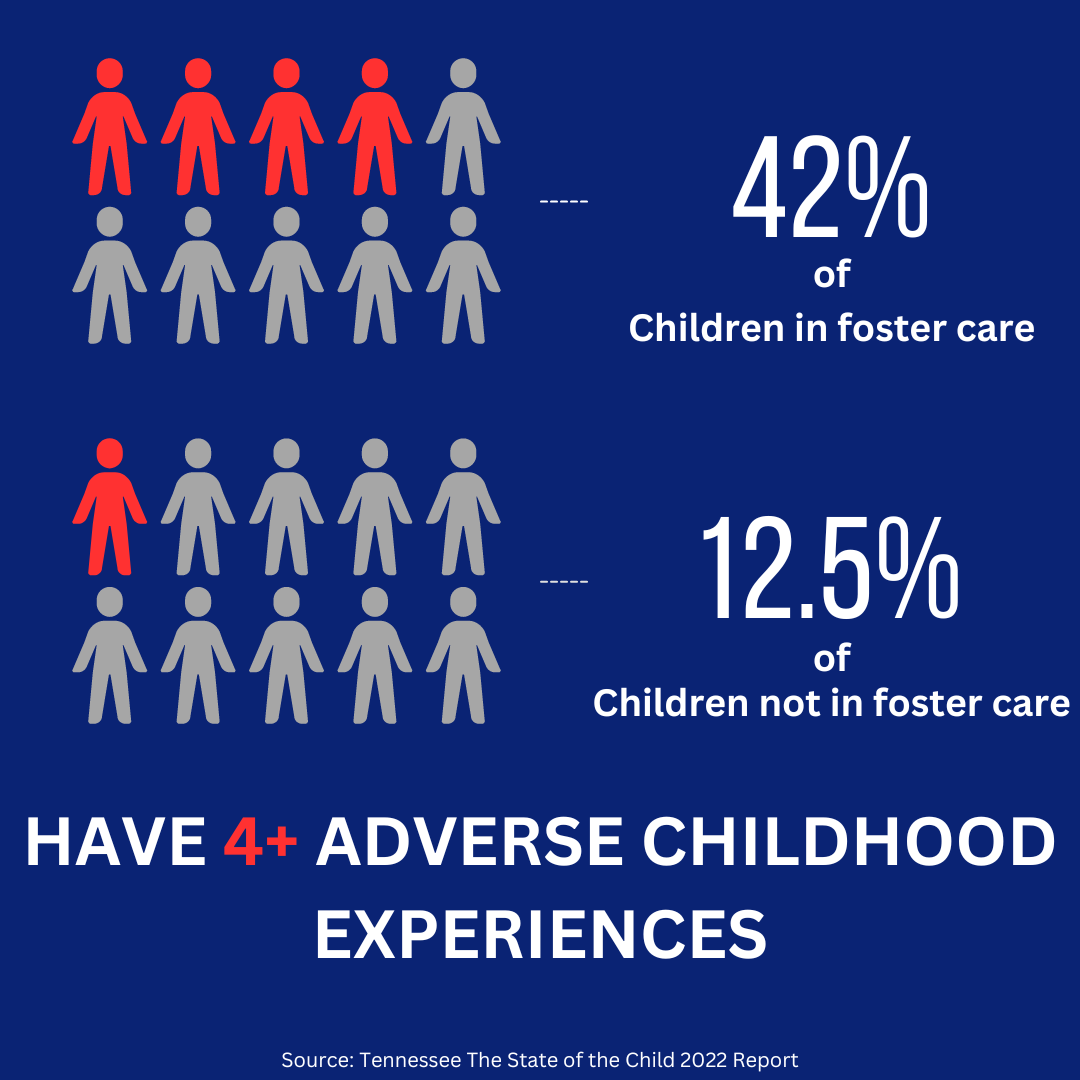
Children in Foster Care
The risk of experiencing four or more ACEs is 30% higher for children in foster care than the general population. Being placed in state custody can be traumatic for a child, especially if the child experiences multiple changes in placements. According to the Tennessee Commission on Children & Youth, in 2019, Tennessee had the highest rate of foster care instability in the nation — indicating a high volume of children likely to experience one or more ACEs. Among these children, Black or African American children are over-represented.
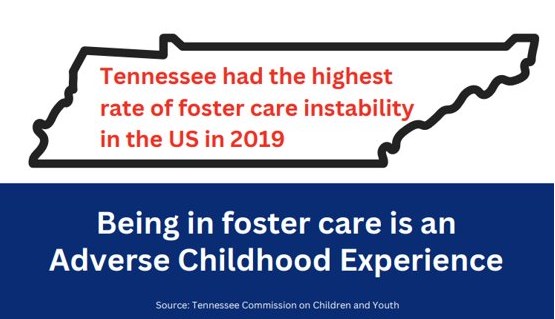
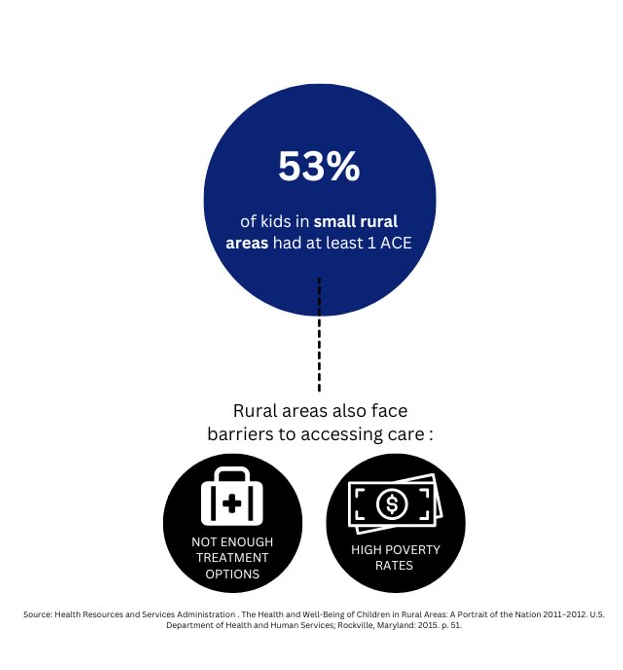
Rural Communities
Research has shown that ACEs are more likely to co-occur in rural areas, with data from the National Survey of Children’s Health showing that 53% of kids in small rural areas had at least one ACE compared to 47% of kids living in urban areas. Rural communities may also lack the treatment or support options available in suburban or urban areas. Rural communities face a poverty rate higher than the national average, complicating access to care due to financial burden.
Children Experiencing Homelessness
Data from 2020 reveal that in Tennessee, 19,747 public school students experienced homelessness at some point during the school year. Children who experience homelessness typically face multiple ACEs, often even before they reach school age. Homelessness among children can lead to compounding ACEs – such as separation from the parents for foster care placement, trauma experienced during shelter stays, and instability of access to necessities such as shelter, nutrition, and education.
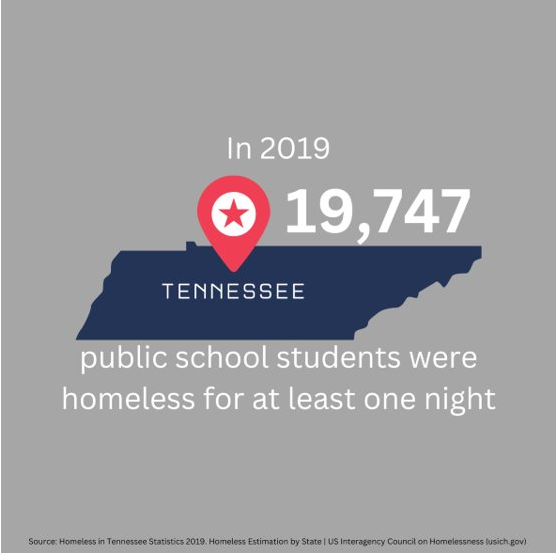
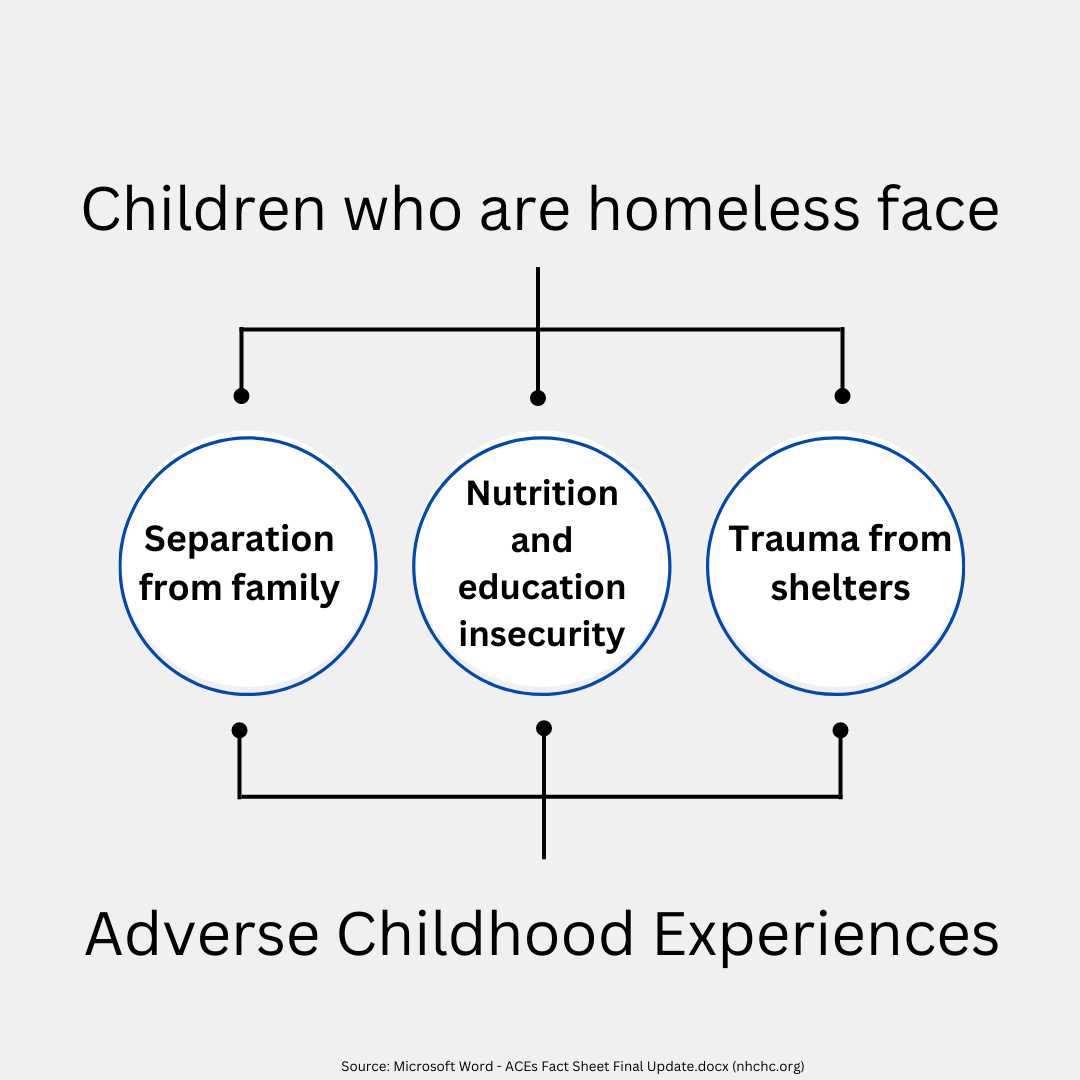
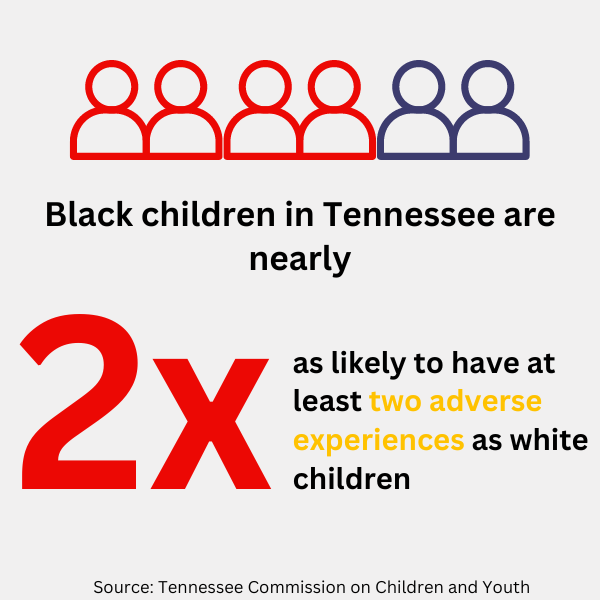
Racial and Ethnic Minorities
Black children in Tennessee are nearly twice as likely to have at least two adverse experiences as white children in Tennessee, according to a report from the Tennessee Commission on Children & Youth. Nationally, the percent of children experiencing one or more ACE is 61% of Black children, 51% of Hispanic children, and 40% of white children — indicating a large disparity for minority groups. The percentage of children in poverty in 2020 was 32% for Hispanic children, 31% for Black or African American children, and 14% for non-Hispanic white children.
LGBTQ+ Individuals
A study from Vanderbilt University Medical Center reveals that 83% of surveyed LGBTQ+ individuals report experiencing at least one ACE, compared to 64% for cisgender heterosexual individuals. More than half of LGBTQ+ respondents, 52%, indicate experiencing at least three more ACEs; a rate that is double from the rate of 3+ ACEs for cisgender heterosexual people.
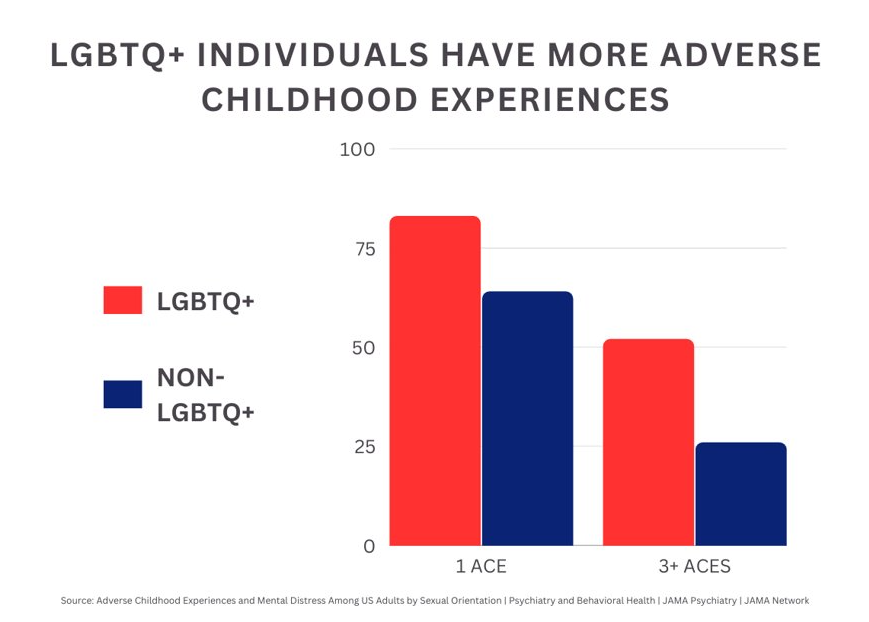
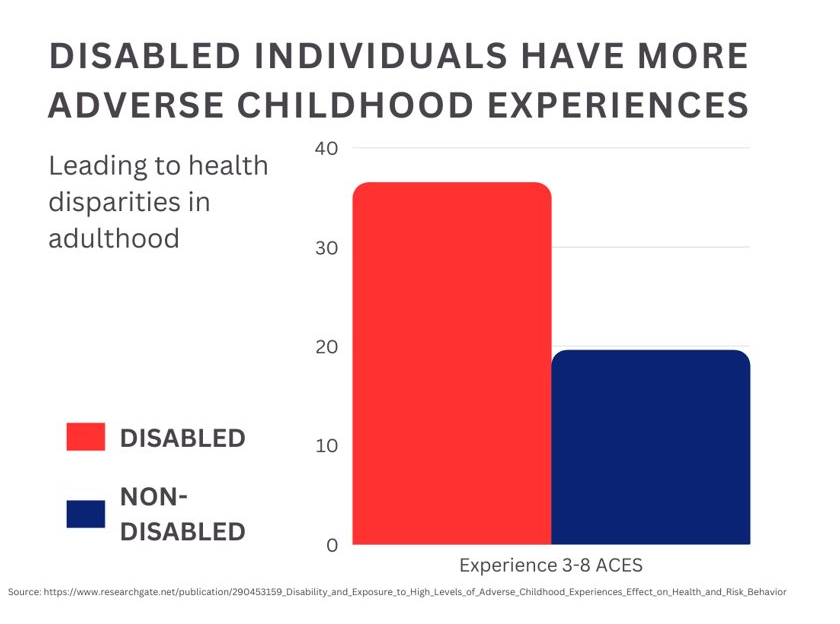
Individuals with Disabilities
Disabled individuals face an increased risk for high ACE exposure compared to individuals without disabilities, according to a study published in the North Carolina Medical Journal. Among disabled individuals, 36.5% report high ACE exposure, compared to only 19.6% for non-disabled individuals. This high incidence of ACEs correlates with health disparities as adults. Particularly, disabled people are more likely to smoke, have poor physical health, have poor mental health, and be diagnosed with depression, compared to those without disabilities.
Activities and Programs: Evidence-informed, actionable, short-term steps that collaborative groups can take to address priority areas.
Policy and Systems Change: Systems change refers to how organizations or programs — such as school systems or health systems — are connected and work together to improve conditions to make change that lasts. This section contains evidence-informed, actionable, long-term steps that collaborative groups can take to address priority areas.
- Host a screening of Resilience, a critically acclaimed documentary that discusses how ACEs can be linked to poor outcomes later in life. Public screenings of the documentary offer an engaging and informative way to introduce the public to ACEs and could initiate a successful public education campaign.
- Teach Skills that Help Parents and Children Thrive. Supporting opportunities for PCEs while reducing the prevalence of ACEs requires teaching and promoting skills to both parents and children regarding stress management, communication, coping strategies, and emotion regulation. Partners may work together to:
- Support emotional skill building in schools to help children strengthen their interpersonal skills and positive self-concept.
- Facilitate dating and relationship programs that teach children about the characteristics of healthy relationships.
- Partner with parenting skills courses and workshops to provide parents with training on positive parenting skills.
- Connect Youth to Caring Adults and Communities. Intentional programming can buffer the effects of ACEs and provide opportunities to foster the necessary PCEs that support thriving throughout the lifespan. Some examples include:
- Mentoring Programs such as Big Brothers, Big Sisters, which pair youth with caring adults outside of the family with the goal of fostering relationships to help children thrive. Mentoring programs are suitable for children of all ages.
- After-school Programs to provide opportunities for children to gather in community in a safe and enriching environment after school and during the summer. Program focus can vary depending on interests or goals. After-school programs can reduce the prevalence of adolescent risk behavior.
- Arts and Cultural Programs provide a shared experience for people to connect over, and art-making activities can promote collaboration and social interaction. Participating in art-related activities, such as painting, drawing, or sculpting, can reduce stress and anxiety, improve mood, and even lower blood pressure and heart rate.
- Strengthen Economic Support for Families. Policies that improve the financial support for families make it easier for families to satisfy children’s basic needs, while simultaneously reducing parental stress and reducing the likelihood of ACEs.
- Connect community members to financial assistance programs such as SNAP, WIC, and childcare subsidies. Understanding eligibility, collecting documentation and paperwork, and appropriately applying for government resources is often overwhelming and can stand in the way of accessing care. Providing community resources, workshops, and partnering with organizations that help access these programs can remove this barrier, allowing more families to benefit from financial assistance services already available and helping lower their financial stress burden.
- Petition for local funding for children’s programs. Local governments can allocate funding for programs that benefit children, such as after-school programs, family workshops, and strengthened services through local libraries.
- Champion federal and state economic policies such as the EITC, CTC, and minimum wage. Provide resources to communities that highlight the importance of these economic policies for mitigating the effects of ACEs.
- Encourage comprehensive paid leave policies such as parental leave, sick leave, and vacation pay. These paid leave policies ensure economic security for families during life events and have been demonstrated to be associated with lower parental depression and stress — both of which are risk factors for child ACEs.
- Shift Social Norms to Support Children’s Thriving. Shifting the conversation from an individual responsibility to a collective responsibility for caring for all children leads to the potential for solutions that address contextual problems and societal solutions, rather than only individual ones.
- Enact long-term public education campaigns to engage the public to shift mindsets regarding an important cause for child health. Effective public education campaigns point out a problem while moving public attention toward the solution. In Tennessee, shifting attention towards PCEs is crucial to move from understanding into action.
- Adopt and encourage Trauma-Informed Care (TIC), a practice that acknowledges that anyone may come from a background of trauma that has effects on health. TIC supports individuals by providing care that recognizes the impact of trauma, responds to the effects of trauma, and actively works to resist re-traumatization. TIC can be adopted in many settings, including healthcare, education, social services, and behavioral services.
- Partner with TN Resilient Collaborative, the statewide public education initiative focused on promoting culture change regarding early childhood and preventing and mitigating ACEs. The initiative aims to increase the potential of all children in TN to achieve thriving through public awareness, sustainable funding, and policy change. The collaborative funds community initiatives and projects each fiscal year that support their overall goals and offers a variety of training opportunities to increase public awareness.
- Support early childhood programs to increase opportunities for children to experience safe, stable, and nurturing relationships. Research affirms that these programs reduce rates of abuse and neglect, improve parenting skills, and improve child behavior outcomes.
- Promote evidence-based early home visiting programs which support new parents with access to caregiver support, parenting resources, and trainings all within the caregiver’s home. When the curriculum implemented is evidence-based, these programs can reduce child abuse and neglect and reduce risk factors associated with child maltreatment.
- Facilitate advancement of high-quality childcare through licensing and accreditation of childcare programs. Funding opportunities for childcare centers to seek accreditation can help smaller centers to gain attention while ensuring quality care for all children who attend childcare programs.
- Promote family engagement in preschool, which is supported by evidence to have positive effects on children’s behavior and long-term positive effects on graduation rates, higher education, and health outcomes.
The Resiliency Project backed by Centerstone
The Resiliency Project is a collective impact initiative operating across 21 Tennessee counties in the Upper Cumberland, South Central, and Mid-Cumberland regions to offer ACEs knowledge and mobilization teams that highlight PCEs and resilience. The project focuses on developing positive community norms that address health disparities and promote resilience throughout communities. Certified trainers in the H.O.P.E. framework train home visitors, parents, social workers, and community members on the science of the positive and PCEs. The work of the Resilience Project is supported by Centerstone Behavioral Health Services.
Contact April Scott at april.scott@centerstone.org
TN Department of Health
- More information on PCEs in Tennessee can be found in this fact sheet.
- Evidence Based Home Visiting can be an effective early-intervention strategy to improve the health and well-being of children and parents.
- Women, Infants, and Children Program (WIC) provides access to nutrition assistance, nutrition education, breastfeeding education and support, and healthcare referrals for mothers of young children. Here are guidelines about eligibility and the application process.
- Community Health Access and Navigation in Tennessee (CHANT) provides care coordination through local health departments. Eligible individuals are connected to resources and support for their health and medical needs, such as reimbursement or assistance with co-pays. Here is the referral form for CHANT that can be used by families or providers.
TN Commission on Children and Youth
- Resilient TN Collaborative is the statewide public education initiative focused on promoting culture change to emphasize Positive Childhood Experiences and prevent and mitigate ACEs. The initiative aims to increase the potential of all children in TN to achieve thriving through public awareness, sustainable funding, and policy change.
- The Home Visiting Leadership Alliance (HVLA) and Young Child Wellness Council (YCWC) are two collaborative action groups that unite stakeholders across the state to focus on improving young child health and promoting Evidence Based Home Visiting. Contact Rob Burke at rob.burke@tn.gov for more information on collaborating with YCWC or HVLA to achieve child-focus health goals.
- KIDS COUNT is a resource to provide data, policy recommendations, and tools to support policies at the local, regional, and state level that promote healthy well-being for children. KIDS COUNT releases yearly trends in child well-being, along with an annual State of the Child report.
TN Department of Education
- Coordinated School Health connects physical, emotional, and social health with education through eight inter-related components. This coordinated approach improves students' health and their capacity to learn through the support of families, communities and schools working together. Click here for best practice suggestions for implementing coordinated school health.
- Tennessee Family Resource Centers unlock potential by serving as a resource and support hub for students and families. FRCs proactively engage with their communities to empower students and families, bridging gaps to ensure access to community resources that support family thriving. Click here to see a map of Family Resource Centers throughout the state.
TN Department of Human Services
- SNAP, the Supplemental Nutrition Assistance Program, provides qualifying households with a grocery stipend to support nutrition accessibility. See a list of family assistance offices that support SNAP applications here.
- The 2 Generation program — 2Gen — focuses on providing a service delivery model that aligns programs towards a “whole family” approach that supports both parent and child. DHS has fully implemented a 2Gen model throughout programming and engages in cross-agency collaborations to promote systems change with the 2Gen model.
Tennessee Office of Criminal Justice Programs
- Handle with Care policies establish a connection between schools and law enforcement when a child has been the witness or the victim of a police-reported incident. When this occurs, the police will send a message to the child’s school that advises to “handle the child with care,” providing an opportunity for the school to provide trauma-sensitive support to the student. Learn more about implementing a Handle With Care policy in your community.
- Family Justice Centers are community-wide collaborations of public and private agencies in a centralized location that serves victims of family violence, sexual assault, and elder abuse. The centers are one place where families can go to receive wraparound services to promote their safety and well-being, a “one-stop shop” for domestic violence and other victims of crime seeking assistance. See a list of TN counties with Family Justice Centers.
Appalachian Promise Alliance
- Bristol’s Promise is a nonprofit that serves the Appalachian highlands region in Tennessee, Virginia, and North Carolina. They engage in practices to foster positive experiences through collaborative action centered around best practices. They offer ACEs education opportunities, networks for youth and parents, and more.
East Tennessee State University
- The ETSU Strong Brain Institute works with organizations to educate employees and individuals served on the effects of traumatic stress and ways to promote resilience. This may include program development, evaluation strategies, grant development, training, and ongoing consultation.
Centers for Disease Control and Prevention
- CDC's Adverse Childhood Experiences page offers fast facts about ACEs, PCEs, and more.
